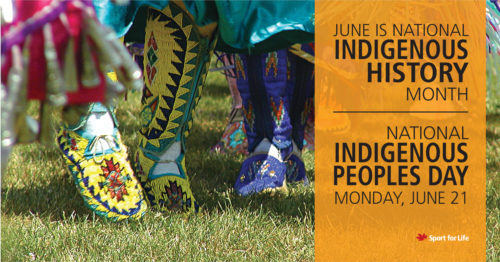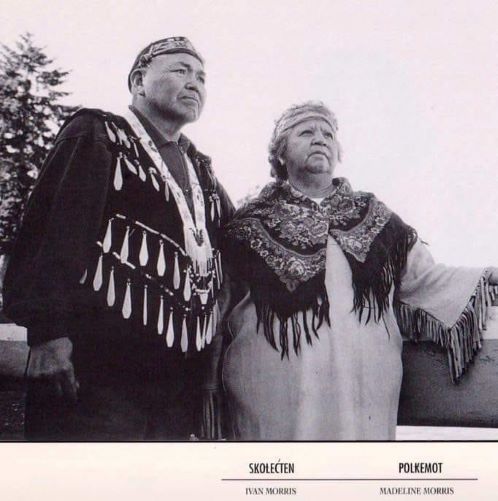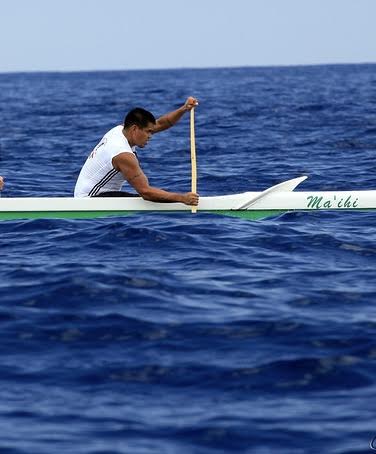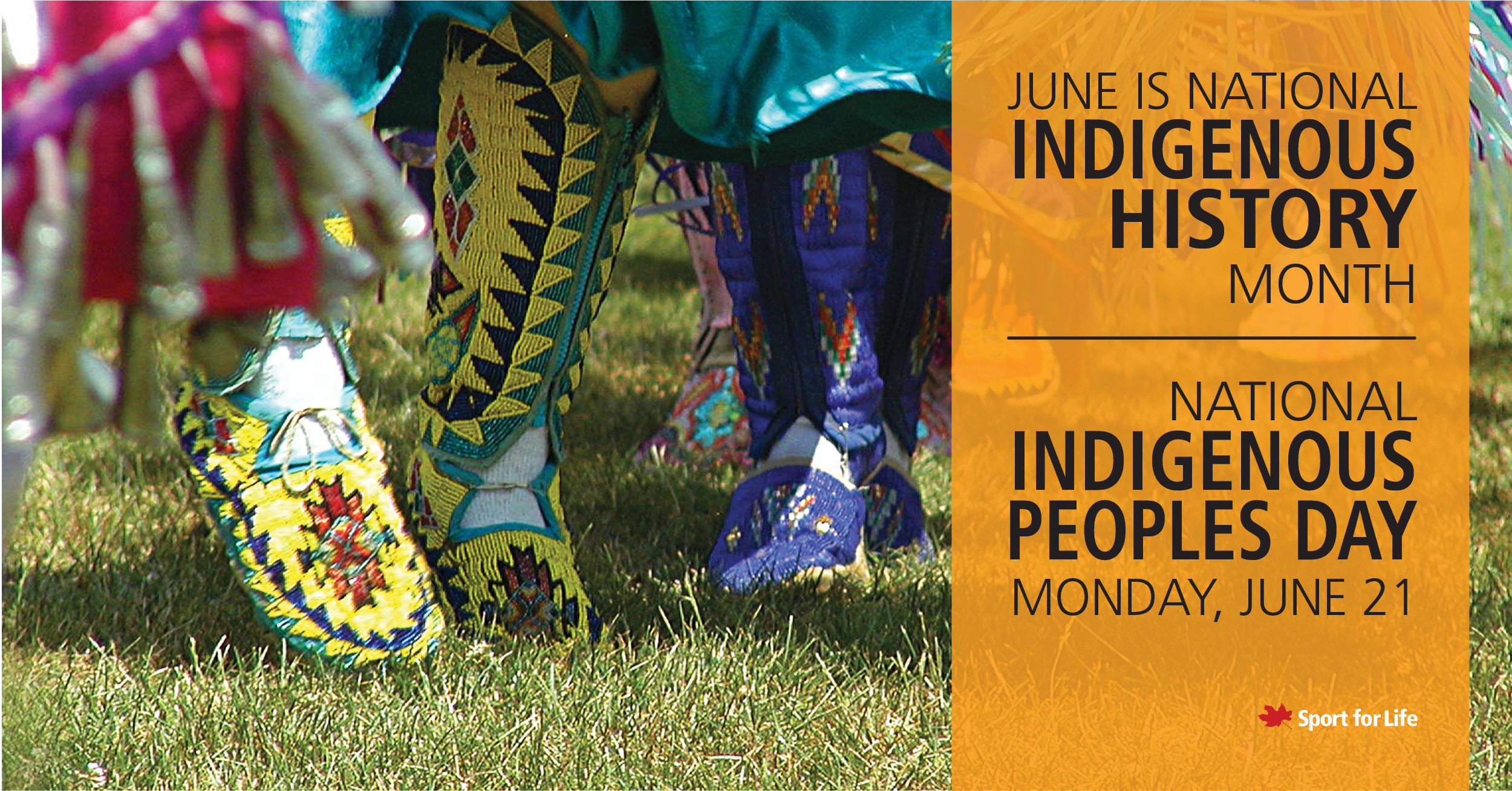Celebrating Indigenous History Month
 Indigenous communities have been coming together to get active, compete and enjoy the benefits of physical activity since long before Canada was a country. During this year’s Indigenous History Month, there are many reasons to celebrate the traditions that have been passed down from generation to generation and the resiliency of the Indigenous people.
Indigenous communities have been coming together to get active, compete and enjoy the benefits of physical activity since long before Canada was a country. During this year’s Indigenous History Month, there are many reasons to celebrate the traditions that have been passed down from generation to generation and the resiliency of the Indigenous people.
One Indigenous athlete with plenty of reasons to celebrate is Len Morris Jr. of the Geronimo Canoe Club, who has raced war canoes all over the globe and recently represented Canada at the international level by racing outrigger canoes in Tahiti and Australia. Hailing from the Tsartlip First Nation, he comes from a long, unbroken line of Indigenous paddlers.
“We’re very family-based. My grandparents Ivan and Madeline started the canoe club in 1974 and it was all family-run. My dad, my uncles and aunties, they don’t paddle too much anymore but they all were involved and they handed it down to me, my brothers and cousins, and now our kids are into it,” Morris Jr. told Sport for Life.
“When my grandparents ran the club they funded it out of their

own pocket. We raced all over lower Vancouver Island, out to Chilliwack and down into Washington State. They covered the ferry, the hauling, the gas. My grandmother would cook and nourish the family before, during and after the race, so it was pretty good to have that.”
Now that his grandparents have passed on, the responsibility for training the next generation of paddlers is with Morris Jr., his brothers and his cousins.
“We have lots of younger kids getting involved, and they should because when I grew up I was down there at three, four, five-years-old learning how to paddle. It’s awesome to see them learning what I did, my cousin’s kids and everyone else, keeping the traditions alive. Training the next generation is up to me, my brothers and cousins. We let them have fun at the beginning but then when they get older we teach them about respecting the canoe and the proper way to be training. We hand down what we were taught.”
Morris Jr. relishes the competitive aspect of the sport as well, and is proud of the accomplishments his team has made over the past few years.
“It’s pretty cool to go to the races and get to visit together. You may be good friends on the beach but when it comes time to race you’re not friends out there. With war canoe races it gets pretty intense out there, especially with the big canoes. It’s about pride,” he said.
“We’ve also transitioned to outrigger Polynesian-style canoes, and we’ve done quite well in the last 10 years or so. We won Canadian nationals five times, and we’ve gotten the chance to represent Canada twice. The first time was the world championships in Tahiti, then we went to Australia in 2019. My son got to do it as well, he participated in the U-19 category for solo canoes and I did the solo as well as the six-man team,” he said.
“It was definitely a big change. It was really eye-opening to see. We do really well in our war canoe circuit but the international level is a whole other ball game, a whole other level.”
Celebrating Indigenous achievements
This year’s Indigenous History Month comes at a time of reckoning for Canada, as the discovery of the remains of 215 children at a residential school in Kamloops has sparked national outrage and made headlines worldwide. For Mataya Jim, who is W̱SÁNEĆ from W,SIKEM with ties to Penálaxeth’ & Wwaayaa, it’s a time of conflicting emotions. As the Coordinator of Indigenous Projects at Sport for Life, she wants to ensure Indigenous resilience is framed beyond tragedy and includes Indigenous achievement, and the accomplishments of athletes such as Len Morris Jr.

Len Morris Jr.
“As an organization we don’t want to solely focus on the victimization of Indigenous people but rather celebrate Indigenous people’s successes despite these challenges, heartbreaks, and things we’ve been through,” she said.
“That doesn’t mean as an organization we ignore these things. We definitely need action and to build awareness about the true history of Canada and its relationship with Indigenous people. But we also need to celebrate and understand there’s a lot of beauty in Indigenous communities and Indigenous sport when we gather and compete, and that needs to be highlighted.”
She is amazed by the resiliency of Indigenous people.
“There have been tragedies in our families and our past, but we need to celebrate our resilience and our strength. Ideally one day we’ll get to the point where we’ll still have that resilience and strength but we won’t need to use it. It would be nice to live in a Canada, or a world, where it doesn’t need to be used all the time.”
Like Morris Jr., Jim grew up with inter-generational sporting traditions, including canoe racing and soccer. That sense of community, and approach to competition, deeply impacted her as a child.
“In those settings we came together and it was very community- and family-based, super welcoming. It’s not like family because it really is your family. We work through kinship in Indigenous communities. Everybody was there to take care of each other, to celebrate and spend time together. During competitions we would travel and see relatives we may not have seen for a long time and compete together. It’s hard to put into words the feelings and the structure there,” she said.
“Indigenous people have been travelling to gather since time immemorial. We come together whether it’s for ceremony or for things like pow wows to dance and celebrate, and it’s the idea of coming together and being active that is a core part of many Indigenous cultures. It just happens to work for sport as well.”
That’s why Jim doesn’t believe Indigenous people should be pressured to fit into the mainstream sport and physical activity systems.
“Often in sport in Canada it gets framed as Indigenous people need to change to be more in line with current western structures but I think it’s a great time to recognize that Indigenous people have great structures that could be applied to the greater Canadian society. We have great teachings and great ways of being, and it’s time to recognize that some of us are still working to get that back because of our history with colonization,” she said.
“It’s a complex balance between recognizing there’s a hard history with Canada but also recognizing we’ve maintained a lot. We’ve been able to take from our own history, and through our own history and our own celebrations we’ve been able to get through the hardships.”
Resources
- Aboriginal Coach Modules
- Aboriginal Sport Circle
- eLearning: Canadian Indigenous Culture Training – Truth and Reconciliation Edition
- eLearning: Stepping Stones to Indigenous Sport and Physical Activity Participation
- First Nations education Committee: Programs
- First Nations Education Steering Committee: Classroom Resources
- First Nations Health Authority: Being Active
- First Nations Health Authority: Services, Programs, and Initiatives
- Grants and Recognition
- Indigenous Communities: Active for Life
- Indigenous Communities: Active for Life Workshop
- Indigenous Long-Term Participant Development Pathway
- Indigenous Long-Term Participant Development Pathway – Sport Organization Guide
- Indigenous Long-Term Participant Development Pathway Workshop
- Indigenous Sport for Life Resources and Workshops Overview
- Indigneous Communities: Active for Life Workshops
- Performance Sport Programs
- Provincial/Territorial Indigenous Sport Contacts
- Youthline: Indigenous and Two Spirit

